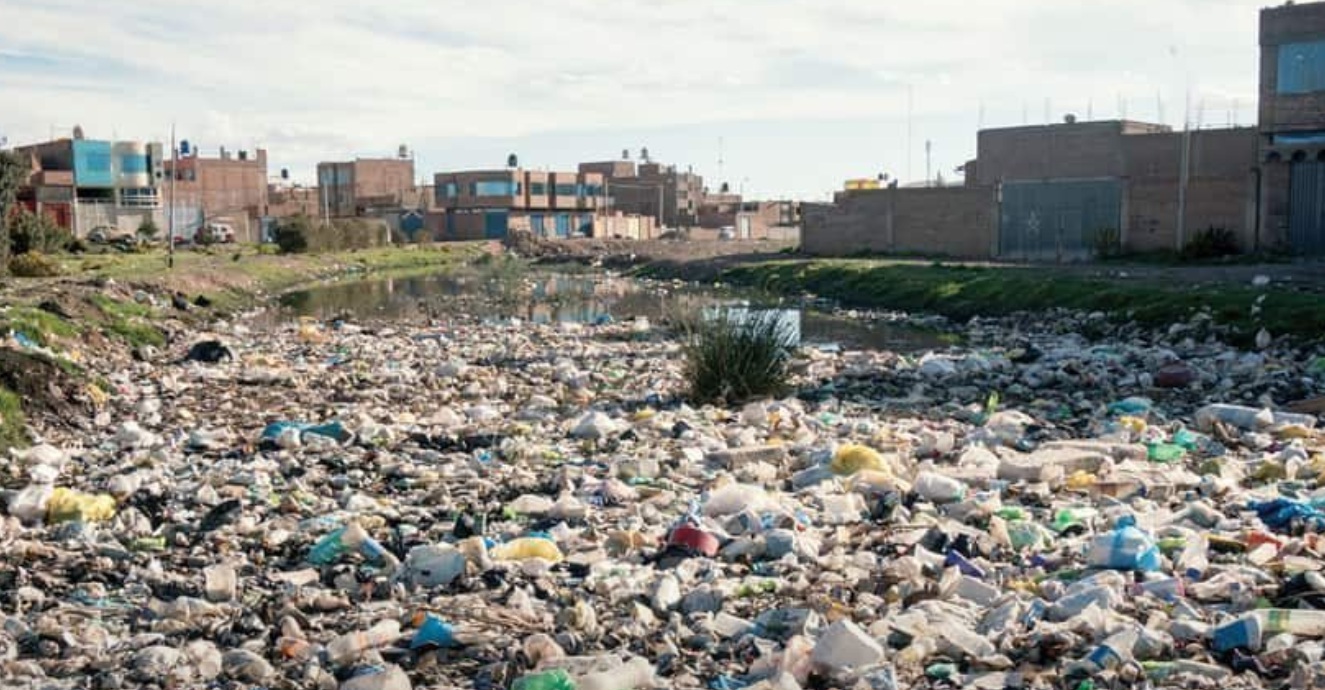Plastic pollution clogs a river in a small town near Puno, Peru in 2017. Photo courtesy of Maryknoll Magazine.
Global Plastics Treaty Setback
UN plastics treaty negotiations collapsed in August 2025 after countries failed to bridge fundamental divides, particularly regarding the contentious issue of whether to include limits on plastic production and restrict harmful chemicals.
Set the world on a path to ending plastic pollution forever,” said Inger Andersen, the Executive Director of the UN Environment Program (UNEP) to the Intergovernmental Negotiating Committee (INC) tasked with developing an international binding agreement on plastic pollution at the opening of the latest round of negotiations in Geneva from August 5 to 15. Her words expressed the hope that the international community could overcome the lack of success that marked the previous round of negotiations in Busan, South Korea.
But after ten days of what was scheduled to be the final rounds of talks, countries had not agreed on a single article in the larger treaty or on next steps in the process.
The peril of plastics is daunting, as the UN Environmental Assembly (UNEA) has pointed out:
“Of the approximately 10 billion tons of plastic produced since the 1950s, studies show that over 8 billion tons are now waste, with between 10-15 million tons of plastic leaking into the marine environment each year. This number is expected to more than triple by 2050.
“Studies have linked unsustainable production and consumption patterns to the exponential growth in plastic pollution, which impacts human health as well as the health of terrestrial and marine ecosystems. In 2022 there were reports of plastic particles found in human lungs and in human blood, and a 2021 report found microplastics in human placenta.”
The Organization for Economic Cooperation and Development estimates that, without global action to curb plastic pollution, plastic production between 2020 and 2040 will grow by 70 percent to 736 million tons. Overall, less than 10 percent of global plastic waste was estimated to have been recycled in 2020, the rest disposed of in landfills, incinerated, or released into the environment.
Deliberations began in 2017 with UNEA passing several resolutions on the best ways to address plastic pollution. It established an Ad Hoc Expert Group (AHEG) to identify a broad range of responses, including voluntary and legally binding governance strategies. This group met four times up to the end of 2020 and issued a long list of recommendations, which reflected a growing consensus on the need to address plastic pollution more broadly. This led to a series of meetings, culminating in the session in Busan, which was unable to finalize a treaty.
The two biggest sticking points were scope, i.e. whether the treaty should mandate large reductions in production leading to a total ban, and financing, whether developing countries that produce and profit from sales of plastics, should also contribute to the international financing mechanism.
Problematic areas were whether production and supply of plastics was under the mandate of the INC, questions of financial assistance for developing countries dealing with plastic waste, whether the treaty would include mandatory or only voluntary measures, and whether it would be international or national.
The failure of the INC deliberations was due, according to the New York Times, to “a league of petrochemical-producing nations staunchly opposed to any controls on production,” even though most environmentalists examining the issue of plastic pollution state that terminating the production of plastics is the only way to eradicate plastic waste. The New York Times also said that agreeing on a treaty using consensus-based negotiations seems to be increasingly out of reach.
As the conference concluded, dozens of delegations expressed disappointment that they could not reach an agreement. Some blamed the process, and a few said it was trying to go beyond its mandate by including plastic production and chemicals of concern in the treaty’s text.
The goal of “ending plastic pollution forever” has suffered a setback but is not out of reach. It is now time to regroup, assess positions, and determine where there is common ground or room to compromise. Many negotiators are tempering expectations for an ambitious agreement and hope that, once adopted, it will be able to evolve and strengthen over time. As delegates left Geneva, some clung to their determination that “we’ll get it next time.”
FAITH IN ACTION: Sign a petition at https://bit.ly/PlasticPollutionCoalitionPetitions

